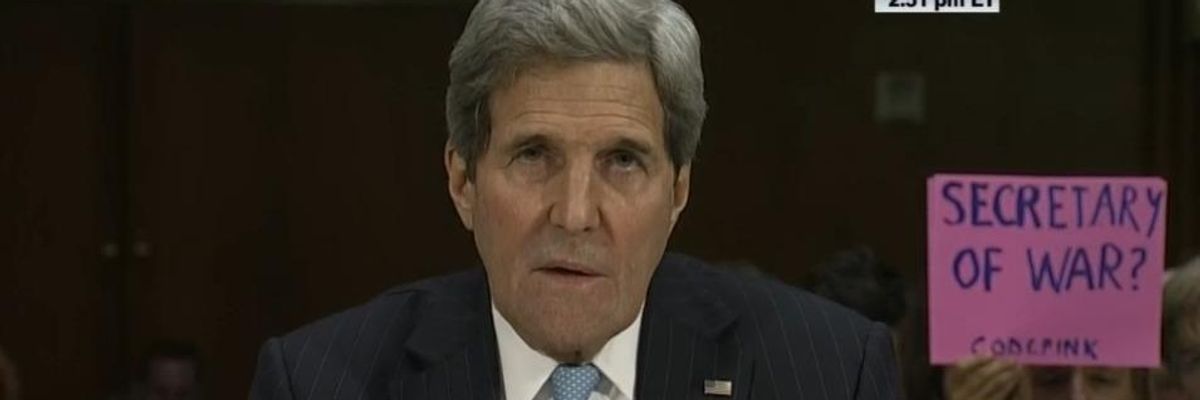Secretary of State John Kerry on Tuesday urged lawmakers to act at their "bipartisan best" and authorize new power for the U.S. to wage, without geographical constraints, open-ended war on Islamic militants.
Kerry made the comments in testimony before the Senate Foreign Relations Committee.
His specific ask was for new authorization for use of military force (AUMF) "that provides a clear signal of support for our ongoing military operations against Daesh," referring to ISIL as it is regionally called.
The White House has faced criticism for using the 2001 and 2002 AUMFs as justification for its current war against militants in Iraq and Syria, and AUMF critic Congresswoman Barbara Lee (D-Calif.) has called the authorization "an overly broad, deeply concerning law that gives any president the authority to wage war at any time, in any place, for nearly any purpose."
In his opening remarks, Kerry said, "It will be years, not months, before [ISIL] is defeated."
"We're determined to work with you, first and foremost to develop an approach that can generate broad bipartisan support, while ensuring that the President has the flexibility to successfully prosecute this effort," he said.
"We do not think an AUMF should include a geographic limitation," he said, adding that "we would not want an AUMF to constrain our ability to use appropriate force against ISIL in those locations if necessary. In our view, it would be a mistake to advertise to ISIL that there are safe havens for them outside of Iraq or Syria."
Though he said the administration believes not deploying ground troops is "the soundest possible policy," he added that the option shouldn't be ruled out of a new authorization, saying that "it doesn't mean we should preemptively bind the hands of the Commander-in-Chief or our commanders in the field in responding to scenarios and contingencies that are impossible to foresee."
Reiterating claims by President Obama, Kerry said, "we can be sure that this confrontation is not going to be over quickly." Though he said that the administration supports the proposal put forth by Sen. Menendez (D-N.J.) to put a three-year limitation into the new AUMF, he urged flexibility with the addition of provision that would allow "for extension in the event that circumstances require it."
Such "flexibility" to wage war has critics sounding alarm.
"Coming from someone who began his political career fighting against an open ended, disastrous war, Sec. Kerry's remarks are deeply troubling," Stephen Miles of Win Without War told Common Dreams. "Hopefully, the President--who also owes his political success to his strong antiwar positions--will support clear, strong limits imposed by Congress on our latest war in the Middle East."
"History will remember Obama harshly if he squanders his legacy by enshrining endless, worldwide war into law," Miles said.

